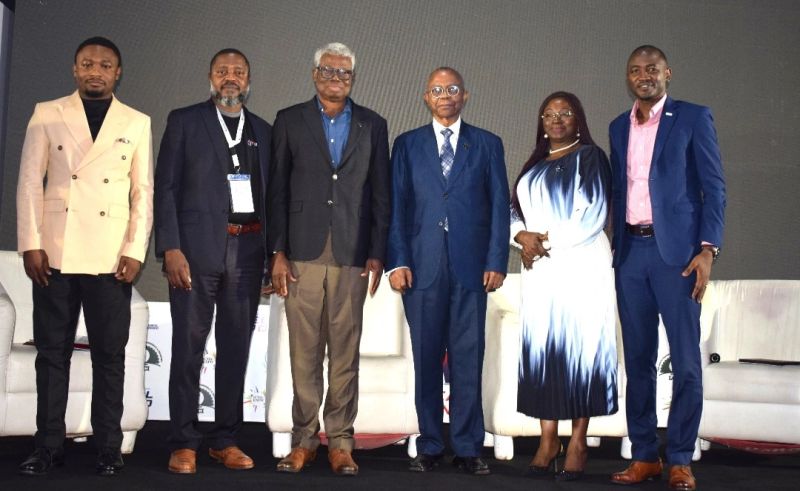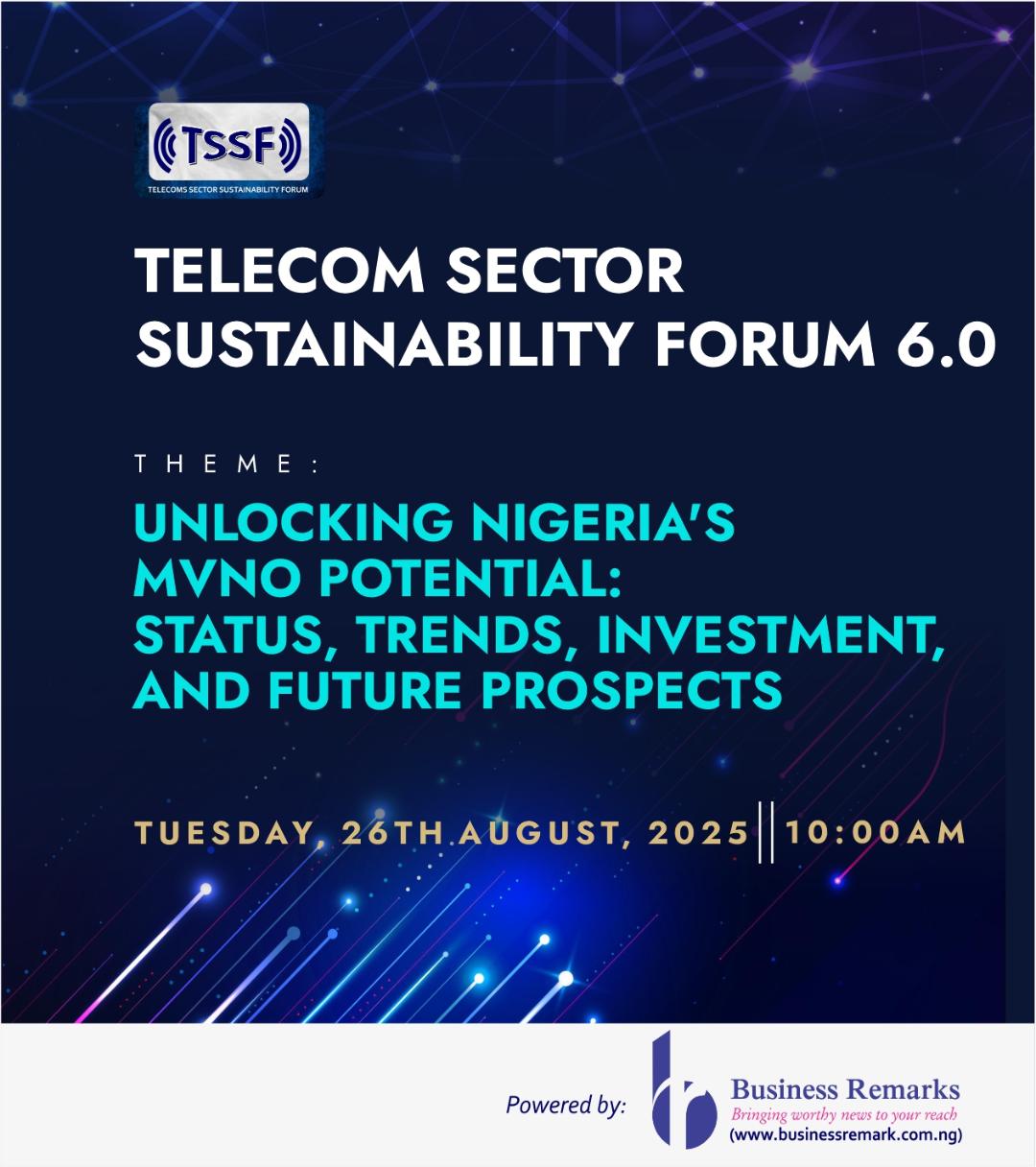Telecom
Experts harp on need to balance innovation with regulation in fintech space

At the recently held 10th edition of the Information Communications and Telecommunication Exhibition (ICTEL Expo), industry experts have emphasized the critical need to strike a balance between innovation and regulation in the fintech sector. The flagship event, organized by the Lagos Chamber of Commerce and Industry (LCCI), with the theme, ‘New Tech: Threats and Opportunities’, brought together key players in the technology and telecommunications and financial services industries.

Panelists at the 10th edition of the LCCI ICTEL Expo on the impact of regulations on fintech operations and innovation.
This year’s edition reflects Nigeria’s present journey towards a self-sustaining and productive digital economy; highlighting the transformative power of emerging technologies, mitigating the associated risks and exploring the endless possibilities they present.
The focus on fintech and telecoms sectors, evaluating their operations, challenges, yearnings and how to improve their services and productivity derives from the critical way in which they are deeply embedded in our lives today.
During a panel discussion on the impact of regulations on fintech operations and innovation, Partnerships Specialist Moniepoint Inc, Emmanuel Abadi, alongside other industry leaders, made a compelling case for increased collaboration across the fintech ecosystem.
Abadi stressed the importance of finding equilibrium between fostering innovation and implementing necessary regulations to ensure stability and consumer protection in the rapidly evolving fintech landscape.
“The regulatory landscape in Nigeria is evolving in a good way especially to the extent that we have hundreds of fintechs that are driving some of the mandates of the CBN today.
“At Moniepoint, we are very passionate about powering the dreams of millions of business owners and the individuals that they support and we have seen that financial inclusion has grown and thrived on the strength of existing regulation.
“We understand the imperative of using regulation as the lynchpin for driving stability in the nation’s economy at large, as well as the need to deepen consumer protection by building systems that will increase the public and regulator’s trust in the services that we as fintechs provide.
“Thankfully, there are channels in place that facilitate information exchange between the regulators and the players, and this has helped us a great deal,” Abadi noted.
Abadi also took the opportunity to showcase Moniepoint’s significant contributions to advancing the government’s socio-economic agenda, as evidenced by the launch of a definitive report around the informal economy, partnerships with the CAC, SMEDAN and Federal Ministry of Industry, Trade and Investment whilst underscoring the potential of fintech solutions to drive positive change in Nigeria’s financial services landscape.
The discussants also called on the need to have targeted guidelines that cater to the nuances and peculiarities of the fintechs and other innovative players, as against the current practice where majority of the rules in place are the same ones developed and applicable to the traditional financial institutions.
They maintained that regular and collaborative engagement between the fintechs and the regulators can fast track the formulation of regulatory guidelines that will be proactive and grow the industry.
The session which was moderated by Hakeem Olajide, CEO, Ascentree Services Ltd also had Ochanya Dan-Ugo, Director /Group Chief Risk Officer, Unified Payments and Seun Folorunso, AGM Projects & Relationships, FintechNGR as co-panelists.
The two-day expo featured a diverse array of activities, including special presentations, masterclasses, product demonstrations, exhibitions, and pitch sessions. These events provided attendees with valuable insights into the latest trends and developments in the information and communication technology sector.
Special guests at the event included President, Lagos Chamber of Commerce and Industry Mr. Gabriel Idahosa, FCA; Engr Leye Kupoluyi, Deputy President, LCCI; VP and Chairperson, Trade Promotion Board, Abimbola Olashore and Director-General, Chinyere Almona.
The ICTEL Expo, now in its tenth year, continues to serve as a crucial platform for industry stakeholders to exchange ideas, showcase innovations, and discuss the challenges and opportunities facing the ICT and fintech sectors in Nigeria.
As the fintech industry continues to evolve rapidly, the insights shared at this event underscore the importance of ongoing dialogue between innovators, regulators, and other stakeholders to ensure a thriving and responsible fintech ecosystem in Nigeria.
Telecom
NCC Wins Global ICT Award for Digital Awareness in Schools

Nigeria, through the Nigerian Communications Commission (NCC), has won the 2025 World Summit on the Information Society (WSIS) prize for its project, the Digital Awareness Programme (DAP), under Category C3, which is on Access to Information and Knowledge.

L–R: Executive Vice Chairman/CEO of the Nigerian Communications Commission (NCC), Dr. Aminu Maida, receives the WSIS 2025 Prize (Category C3: Access to Information and Knowledge) from the Secretary-General of the International Telecommunication Union (ITU), Doreen Bogdan-Martin, following the selection of the Commission’s Digital Awareness Programme (DAP) as winner of the category.
The DAP, one of hundreds of projects submitted for the WSIS Prizes competition 2025, received the highest number of votes in its category, earning it the top honour. The programme equips secondary schools across the country with Information and Communication Technology (ICT) resources and provide internet connectivity to support teaching, learning, and research. Since inception in 2006, over 300 schools across Nigeria’s six geopolitical zones have benefitted from the programme.
The Executive Vice Chairman of the NCC, Dr. Aminu Maida, received the award during the WSIS Prizes Winners 2025 Ceremony held on Monday in Geneva, Switzerland.
In his acceptance remarks, Dr. Maida thanked the hosts, the International Telecommunications Union (ITU) and WSIS, for recognising Nigeria’s efforts in promoting inclusive digital access across Nigeria, noting that the award would serve as further motivation for the Commission.
“This recognition is more than a celebration of past efforts—it is an encouragement to press forward. It affirms that investing in digital inclusion is investing in national development, and that Nigeria’s work is being seen and valued on the global stage,” Dr. Maida said.
Four other Nigerian projects—the Women Techsters and the Advanced Digital Empowerment Programme for Tertiary Institutions (ADEPTI) under Capacity Building, the Telecom-Based Research Grant Initiative under Enabling Environment, and the Digital Learning Initiative under e-Learning—were also celebrated for their nomination for the Champions Category of Projects at the WSIS Prizes Ceremony. Although they were not among the top-voted entries, they were acknowledged for their significant merit and impact.
The WSIS Prizes competition recognises and promotes projects that effectively leverage ICTs to advance sustainable development. The competition showcases how technology can serve as a powerful tool for addressing global challenges and achieving the SDGs. Projects from around the world are recognised annually, highlighting diverse approaches to building an inclusive information society.
The World Summit on the Information Society (WSIS) is a United Nations (UN) initiative aimed at building a people-centred, inclusive, and development-oriented information society. It provides a multi-stakeholder platform to address issues related to Information and Communication Technologies (ICTs) and their role in achieving sustainable development.
The Forum is an annual event that brings together high-level representatives from governments, the private sector, civil society, academia, the technical community, and international organisations. It serves as a global platform for implementing the WSIS Action Lines, which are aligned with the UN Sustainable Development Goals (SDGs).
Telecom
No More Excuses: NCC Sets Tough August Deadline to Tackle Telecom Hitches

Nigerian Communications Commission (NCC) has given telecom tower operators in the country August 2025 deadline to fix persistent network hitches in their facilities or face regulatory sanctions.

The Executive Vice Chairman (EVC) of the commission, Dr. Aminu Maida, reportedly gave the ultimatum during a high-level meeting with key industry players, attended by representatives of IHS Towers, American Tower Corporation (ATC), and Pan-African Towers, and mobile network operators (MNOs) in Abuja
According to sources, discussions at the meeting focused on the recurring challenges in the telecoms sector, particularly power failures, equipment malfunctions, and insufficient site maintenance, that have been causing poor Internet and call services in the country
Specifically, Maida tasked the tower operators on the imperative of complying with the NCC’s updated Quality of Service (QoS) framework, which now extends performance obligations to infrastructure providers, not just telecom service providers.
According to him, the timeline given by the commission is more than enough time for all parties to align with the performance standards expected of them.
Recently, to ensure compliance with the standards, the NCC introduced a Major Incident Reporting Portal for real-time outage disclosures; developed public performance dashboards to enhance transparency; mandated that telecom tower companies meet strict Key Performance Indicators (KPIs).
Although the tower operators had previously cited delayed payments from MNOs as a reason for service lapses, the NCC had dismissed the justification, insisting that all parties must meet their obligations.
The EVC maintained: “Operators must fulfill both their technical and financial responsibilities. Poor service delivery—regardless of internal disputes—will attract consequences.”
Available data on the telecom tower infrastructure shows that IHS Towers has the largest assets with 16,000–19,000 sites, (62% market share); compared to American Tower Corp’s (ATC’s) about 8,270 towers; and Pan-African Towers’ 760–1,000 sites nationwide.
The latest NCC’s August deadline is believed to be putting pressures on the tower operators to improve the quality of their facilities for improved services as the commission had hinted of its plan to sanction defaulting operators with fines or stricter regulatory actions.
Industry experts believe that the NCC’s directive is a welcomed development as it will ensure reliable Internet connectivity and improved services quality for telecom consumers in the country.
Telecom
NCC to Chart MVNO Growth Path at Telecom Sustainability Forum 6.0

Nigerian Communications Commission (NCC) is set to play a pivotal role at the upcoming 6th edition of the Telecom Sector Sustainability Forum (TSSF 6.0), where it will lead a critical discussion on the sustainable growth of Mobile Virtual Network Operators (MVNOs) in Nigeria.

Set against a backdrop of innovation and opportunity, this forum, organized by Business Remarks, aptly themed “Unlocking Nigeria’s MVNO Potential: Status, Trends, Investment, and Future Prospects,” is scheduled for August 26, 2025. This event reinforces the nation’s commitment to fostering a robust, competitive, and inclusive telecommunications landscape.
The forum will bring together a diverse array of key stakeholders from across the telecom ecosystem to deliberate on strategies for integrating MVNOs effectively into Nigeria’s rapidly evolving digital economy. With the recent advancements in technology and the issuance of 43 MVNO licenses to new players, MVNOs are poised to significantly enhance service delivery, drive digital transformation, penetrate underserved markets, and stimulate healthy competition across the sector.
As the global MVNO market is experiencing significant growth, with projections indicating continued expansion, experts believe that with the right regulatory environment and access to infrastructure, emerging markets like Nigeria can leverage MVNOs to unlock new value for both operators (by utilizing excess network capacity) and customers. Customers can enjoy a rich array of niche value-added services tailored to their needs.
Having been proactive in introducing a five-tier MVNO licensing classification, each with distinct services and a 10-year validity period, signaling a clear path for new entrants, the telecom regulator (NCC) will deliver a keynote address outlining the Commission’s regulatory framework, interventions, and commitment to ensuring a conducive environment for MVNO operations.
Mrs. Bukola Olanrewaju, Convener of the forum and Managing Editor of Business Remarks, emphasized the importance of collaboration. “TSSF 6.0 is designed to be a melting pot of ideas, bringing together Mobile Network Operators (MNOs), MVNOs, telecoms infrastructure providers, Internet Service Providers, industry associations, and technology experts,” she said.
“Our goal is to ignite discussions that will shape the future of MVNOs in Nigeria, ensuring their sustainable growth and their critical role in extending digital prosperity across the nation.”
The forum will feature interactive sessions, thought-provoking panel discussions, insightful paper presentations, and abundant networking opportunities. This event aims to provide a platform for stakeholders to share insights, address challenges, and explore collaborative pathways for sustainable growth.

 Telecom1 day ago
Telecom1 day agoY’ello Care’s 21-Day Campaign Bridges Digital Divide for Thousands Nationwide

 General News1 day ago
General News1 day agoEnugu Air Commences Operations Today

 E-Business1 day ago
E-Business1 day agoGalaxy Backbone, Rural Electrification Agency Commit to Deepening Digital and Energy Access Across Nigeria

 Broadcasting1 day ago
Broadcasting1 day agoNDPC Slaps Multichoice with ₦766M Fine for Data Privacy Violations

 News1 day ago
News1 day agoLagos-Calabar Highway Gets $100M Push from ECOWAS to Drive Regional Growth

 Telecom1 day ago
Telecom1 day ago20 Years of Digital Leadership: Layer3’s Legacy and the Road Ahead

 News1 day ago
News1 day agoNBS May Release Rebased Figures for Nigerian Economy July 11

 E-Financial3 hours ago
E-Financial3 hours agoAscensia Finance Commences Operations in Abuja


























